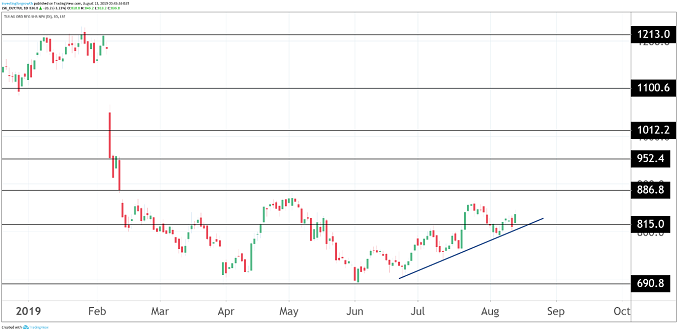Why TUI shares are up after profits crash
Buyers have returned to TUI despite these results. Our head of markets explains what's going on.
13th August 2019 10:09
by Richard Hunter from interactive investor
Buyers have returned to TUI despite these results. Our head of markets explains what's going on.

Set against a raft of challenges, travel operator TUI (LSE:TUI) is making valiant efforts to regain previous growth.
A change in consumer behaviour following last summer's heatwave has, in part, led to overcapacity in Spain, while inevitably there has also been something of a retrenchment given uncertainty around the UK's European exit. Pricing and margin pressure remain intense within the industry and show no sign of abating, while the net debt figure has spiked sharply higher, partly due to acquisitions.
However, the chief culprit to a decline in third-quarter profit of 85% - and with a likely significant impact for the full year – has been the forced grounding of its Boeing 737 fleet, to which there is no resolution currently in sight.
The company had previously guided that the overall cost was likely to be in the region of €300 million and has booked around half of that number so far. Unfortunately, these costs, including the leasing of replacement aircraft, could drag on for some time, which will put further pressure on profitability.

Source: TradingView Past performance is not a guide to future performance
For all this, the overall picture is one which shows the benefits of a diversified business model. Its significant other income streams, most notably Holiday Experiences, Cruises and Destination Experiences have performed strongly in the year to date.
In terms of the summer so far, bookings are virtually flat as compared to last year, which is some achievement given the circumstances and the outlook for the remainder of the summer is upbeat.
Revenues overall have increased, even if they have not converted to bottom line profits, and investment in the business continues apace with one eye on the future.
Meanwhile, the current dividend yield of 8% is, for the moment, adequately covered and of some solace to investors who have suffered in recent times. It remains to be seen whether the level of dividend will be maintained, but even a projected yield of 6% remains tempting to income-seekers.
TUI had the kitchen-sink experience earlier in the year with two profit warnings, so the lack of any further shocks has resulted in a warm share price reaction to these numbers.
However, there is a considerable way to go in repairing the damage, whereby the shares have fallen 48% over the last year, as compared to a 5% decline for the wider FTSE 100 index. Even so, the road to recovery is visible given the group's diverse model and the market consensus of the shares as a buy reflects optimism that the company will come through.
These articles are provided for information purposes only. Occasionally, an opinion about whether to buy or sell a specific investment may be provided by third parties. The content is not intended to be a personal recommendation to buy or sell any financial instrument or product, or to adopt any investment strategy as it is not provided based on an assessment of your investing knowledge and experience, your financial situation or your investment objectives. The value of your investments, and the income derived from them, may go down as well as up. You may not get back all the money that you invest. The investments referred to in this article may not be suitable for all investors, and if in doubt, an investor should seek advice from a qualified investment adviser.
Full performance can be found on the company or index summary page on the interactive investor website. Simply click on the company's or index name highlighted in the article.